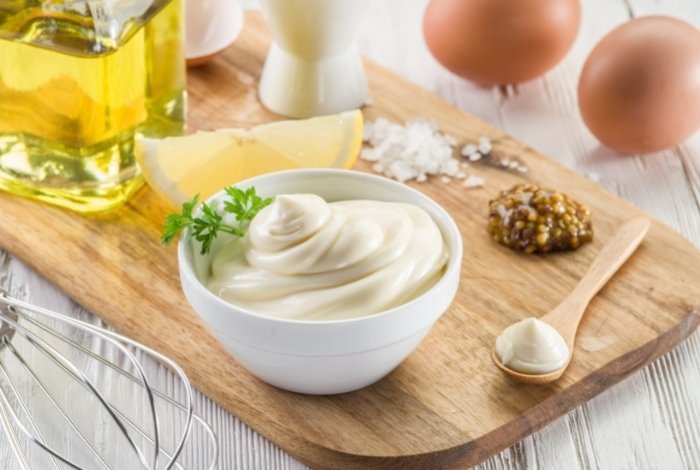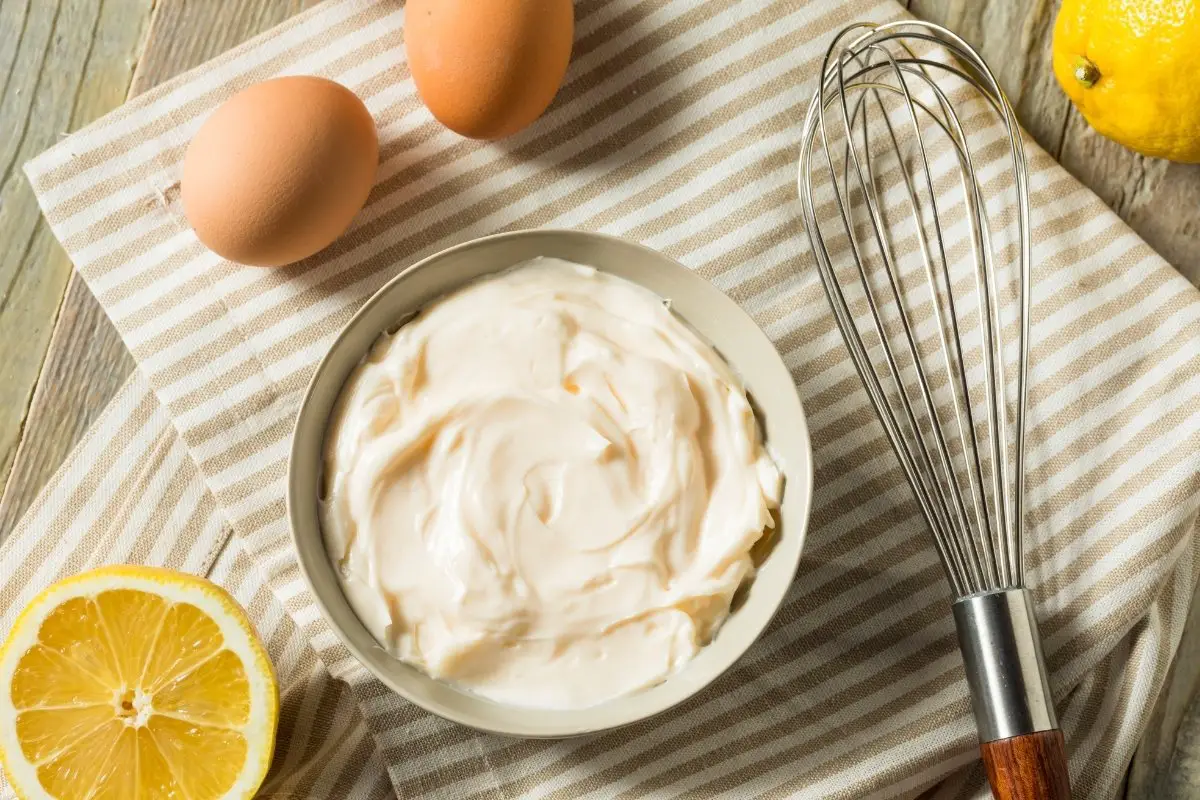Last Updated on October 18, 2024
I s it possible to find a mayo without soybean oil or canola oil? When it comes to mayonnaise, the popular options usually contain soy or canola oil, and for most people who avoid these ingredients, finding good mayo can be a problem. You can bet there are alternatives to choose from.
Many people may opt for hummus in their dips instead, and when it comes to the best ones for you, there are a few things you want to consider. But before we get into it in detail, let’s first learn something or two about mayonnaise.
Table of Contents
What Is Mayonnaise?
Mayo is prepared for use as a condiment for meal preparation. The common ingredients in the mix are eggs, oils, and flavors like mustard and salt, with other acidic ingredients which serve as preservatives such as vinegar or lemon juice.
When it comes to the things you can do with mayo, the list is quite endless. Want to bake a cake, make a burger, potato salad, burger, pie, and all the rest where you may need a light spread? You can find mayonnaise to be helpful. But what most people aren’t happy about is the high-fat contents in soybean and canola oil options of mayo. And this brings us to why you would prefer soy-free mayonnaise.

A Mayo Without Soybean And Canola Oil?
So you happen to be shopping for mayonnaise for the home and are looking for a safe option that won’t put you at risk. Opting for those containing oils may not be your ideal pick. And this is for one reason. Soy and canola oils are high in fat, which can be a turn-off for people interested in a low-fat diet.
A high-fat diet could put you at risk of high levels of bad cholesterol LDL, which can cause stroke and increased chances of heart disease. Your red blood cells could also take a beating, and there is also the issue of insulin resistance. The bottom line is there is a lot at stake with a high-fat diet, and for safety reasons, you want to opt for low-fat alternatives when in the mayonnaise market. Not sure which low-fat oil option is best for you? There are suggestions in the next section for mayo alternatives without soy or canola oil.
Find more Green Tips here:
Better Alternatives To Soybean And Canola Oil
When in the mayonnaise market, your best bet is to opt for those containing healthier oil sources. While soybean and canola oil may be high in fat, other low-fat alternatives may be better suited for you. And if this is okay with you, vegan and organic oils may be the way to go. Some could help with your health and also ensure you get the best out of any mayonnaise dish.
Mueller Austria Ultra-Stick 500 Watt 9-Speed Immersion Multi-Purpose Hand Blender Heavy Duty
Coconut And Avocado Oil Mix
If you happen to find brands that combine healthy vegetable oils such as coconut and avocado, it may be a better option for a safer mayo. What you get is a full and rich ingredient that would be ideal for any dish where mayonnaise is required. You want to look out for those without GMOs and any artificial ingredients. Find one, and you can be sure to avoid high fats in your dish.
Olive Oil
You could also do a lot with olive oil in your cooking, and if you are looking for mayo options with healthy fat, you want to look at those containing olive oil. While it is healthy, you want to be careful how much you use, as it is high in calories. It is equally suitable for the heart, reduces high blood pressure, and works wonders for inflammation. You could add it to your baking, and cooking and also use it for frying.
Sunflower Oil
Find any mayo that’s organic without eggs and a little sunflower oil. Then you surely want to check it out. With many of the available brands in this category skipping out on high-fattening ingredients, these should be ideal for those looking to cut down on cholesterol.
How Much Oil for One Egg Mayonnaise?
The precise amount of oil required will vary based on the size of the egg yolk and the desired thickness of the mayonnaise. Some people like thicker, more spreadable mayonnaise, while others prefer a thinner, runnier consistency. In any case, you can adjust the amount of oil you use to achieve the desired consistency.
Here’s an example:
To make a traditional mayonnaise, you will need one egg yolk, 1 tablespoon of lemon juice or vinegar, 1/4 teaspoon of salt, and 1 cup of oil. Start by whisking together the egg yolk, lemon juice or vinegar, and salt in a medium-sized mixing dish. Then, while whisking continuously, gradually pour in the oil until the mixture thickens and emulsifies into a smooth and creamy consistency.
When creating mayonnaise, it’s also crucial to use high-quality oil because it affects the flavor and texture of the final product. Light and mild-flavored oils like canola or vegetable oil are typically used in mayonnaise, but you may also experiment with different oil like olive oil or avocado oil to give your mayonnaise a distinct flavor. The most important thing is to use high-quality oils and modify the amount as needed to reach the desired consistency.
What Oil Does Gordon Ramsay Use For Mayonnaise?
Gordon Ramsay, like many other chefs, uses a variety of oils in his cooking, including olive oil, canola oil, and vegetable oil. To be honest, it’s hard to say with 100% certainty which oil he uses, but based on some of his recipes, it can be concluded that he prefers to use vegetables when preparing his homemade mayonnaise.
How to Make Olive Oil Mayonnaise without Eggs?
Although you may not believe it at first since most people associate mayonnaise with egg mixture, it is very possible to make creamy, tasty, homemade mayonnaise without eggs. What’s the nicest part of all? It can be completed in a flash!
Ingredients:
- 1/2 cup of olive oil
- 1/4 cup of water
- 1 tablespoon of lemon juice or vinegar
- A pinch of salt
- 1/4 teaspoon of Dijon mustard (optional but preferable)
Instructions:
#1: In a blender or food processor, mix the olive oil, water, lemon juice or vinegar, salt, and Dijon mustard (if using) to make the mayonnaise.
#2: Blend the ingredients on high speed until they are well combined and the mixture has thickened into a smooth, creamy mayonnaise.
This egg-free mayonnaise is an excellent option for people who are allergic to eggs or wish to avoid eating eggs. The olive oil imparts a deep, aromatic flavor to the mayonnaise, while the water thins the mixture and creates a smooth, creamy texture. As we mentioned earlier, to reach the appropriate thickness, alter the amount of water used. You can store it in the fridge for up to a week in a jar or airtight container; give it a good stir before using because the oil and water may separate over time.
Did Hellman’s Stop Making Canola Mayonnaise?
World-renowned company Hellman’s offers a wide variety of mayonnaise products, including canola mayonnaise made with canola oil instead of soybean oil. However, here is good news for everyone. Despite the rumors that have been circulating lately, this popular brand hasn’t stopped making its famous canola mayonnaise.
Hellman’s canola mayonnaise is an excellent choice for those who prefer the flavor and health advantages of canola over soy. The thing is, canola oil has less saturated fat and more heart-healthy monounsaturated fat than many other types of cooking oil. It also has a mild, neutral taste that allows the other mayonnaise components to show through.
For all those who have never tried it, we advise you to do so as soon as possible. It is available at many grocery stores and supermarkets across the United States, but it can also be found online on Hellman’s website and various e-commerce sites.
Final Thoughts About Mayo Without Soybean Oil or Canola Oil
When in the market for mayo and ketchup or the like, you want to avoid those with high fat. These include high-calorie plant-based ingredients and excess eggs. A better alternative will be to opt for organic options with less fatty ingredients. And when it comes to picking the right one, you want to check through the ingredients on the list. If you have the time and ingredients, you can also make yours indoors.

Barbara is an environmental activist and sustainability advocate who loves living green and sustainable. She firmly believes in reducing her carbon footprint and has been making great strides towards achieving this goal. Barbara is a vegan and avid recycler and has been actively involved in community gardens and other green initiatives. She is passionate about spreading awareness about the importance of living in a sustainable and eco-friendly manner. Barbara is always looking for ways to make a difference in her community and beyond. She is a huge advocate for preserving nature and the planet for future generations.


